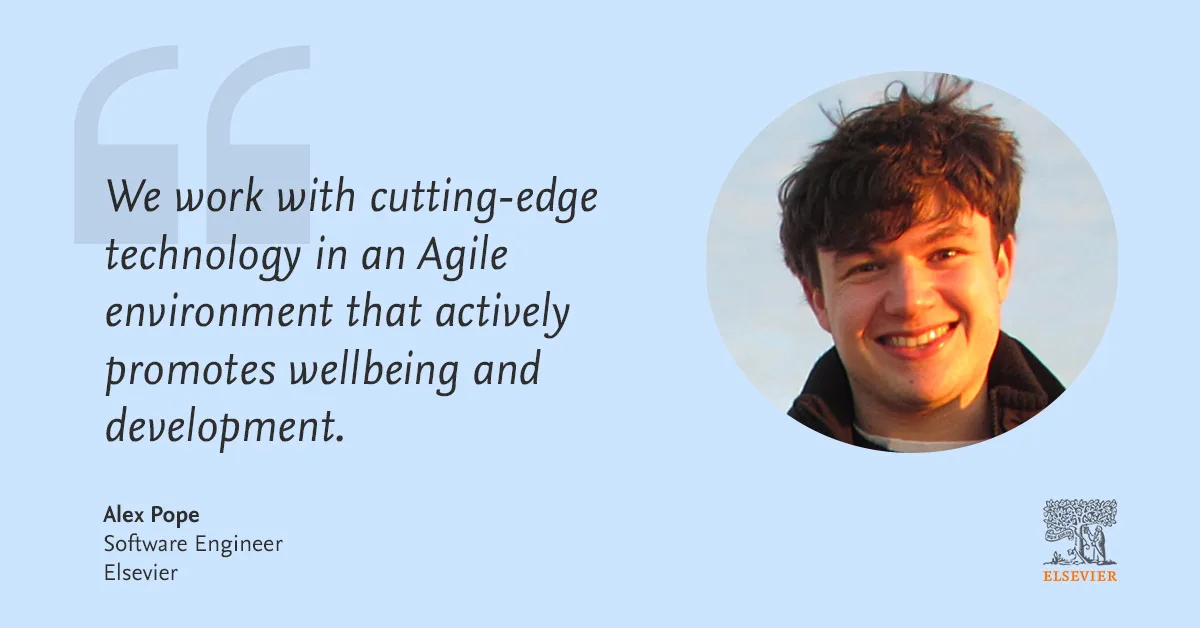Life as a software engineer at Elsevier
21. Juli 2022
Von Alex Pope

Working for a technologically progressive company is not what I expected — and that’s a good thing.
Try turning it off and on again.
So said Roy from The IT Crowd Wird in neuem Tab/Fenster geöffnet. For those unfamiliar with the British sitcom, it was a program about two technicians. Their day job involved much mindless repetition, but they also got themselves into various amusing scrapes.
We’ve all been on projects like that, minus the amusement.

When I was taking my first steps in software engineering, I was brought up on these stories. Both my parents cut code at various points in their careers. Much of my extended family either are or have been software engineers. Horror stories about unrealistic deadlines, working with legacy systems that are written in an ancient language or have Byzantine levels of complexity, and no opportunity for skills development have all been shared within my familial environment.
Elsevier is different.
I should explain that our company supports some of the smartest people in the world. We help researchers make scientific breakthroughs, and we help clinical professionals save lives. So it’s crucial for us to understand our customers’ challenges and build tools that are as sophisticated as the work they do — while also being ready to respond quickly to the rapidly changing world of science, technology and healthcare. Here are three ways we do this:
First, Elsevier has Agile workflows embedded within the company. We use various Agile methodologies, including Scrum Wird in neuem Tab/Fenster geöffnet and Kanban Wird in neuem Tab/Fenster geöffnet. We also have Agile coaches in various departments, who oversee Agile practices and host regular Agile workshops to help improve our Agile culture. I’ve been fortunate enough to perform the role of Scrum Master on multiple occasions, so there is also scope for engineers to enable Scrum practices on a project-wide scale.
Second, Elsevier utilizes cutting-edge technological practices. We’ve increasingly been exploring new ways to integrate machine learning and artificial intelligence into our systems. I’m involved in building ML-driven digital assistants to enhance our customer experience. So far, we have rolled out digital assistants for Mendeley and ScienceDirect. They have already assisted customers with various account related issues via walkthrough solutions and by giving our Customer Support representatives salient information to assist with more complex queries. Additionally, our focus on accessibility ensures that our assistants are inclusive of all users. We also use various cloud providers, including AWS and Oracle; tools to analyze code quality and security; and automation servers to enable Continuous Integration.
Third, Elsevier is focused on improving your technical skills, and they provide access to resources to help you progress. These include online resources, such as Percipio and Udemy, which provide pathways towards upskilling. I’ve found the mandatory cybersecurity training particularly useful, as it has embedded a security-first mindset into my development practices. There are also other avenues for growth and development, which can be acquired through participation in one of our innovative projects or utilizing the reserved development days.
Above all, Elsevier cares about you as an individual. During the COVID lockdowns in the UK, we had various wellness days where we could take time off to focus on our wellbeing. Additionally, there have also been a variety of events at our office locations, such as one to celebrate the Queen’s Platinum Jubilee in the UK. These help to foster a fantastic team spirit and provide great opportunities for networking.
As software engineers at Elsevier, we might not get ourselves into numerous hilarious hullabaloos. Instead, we work with cutting-edge technology in an Agile environment that actively promotes wellbeing and development. And beyond that, we have fun.
